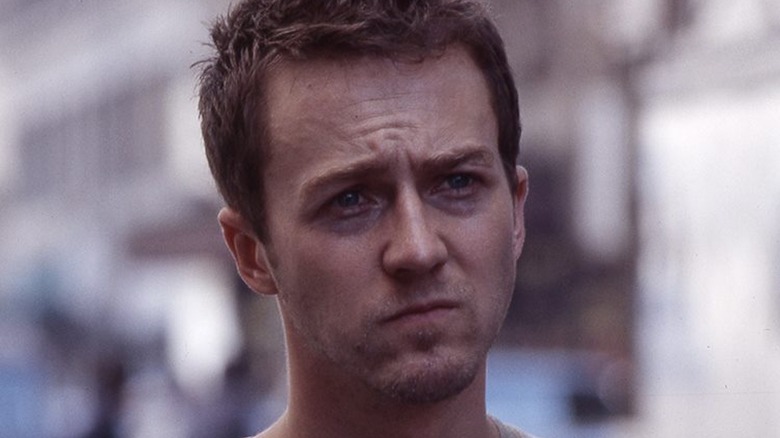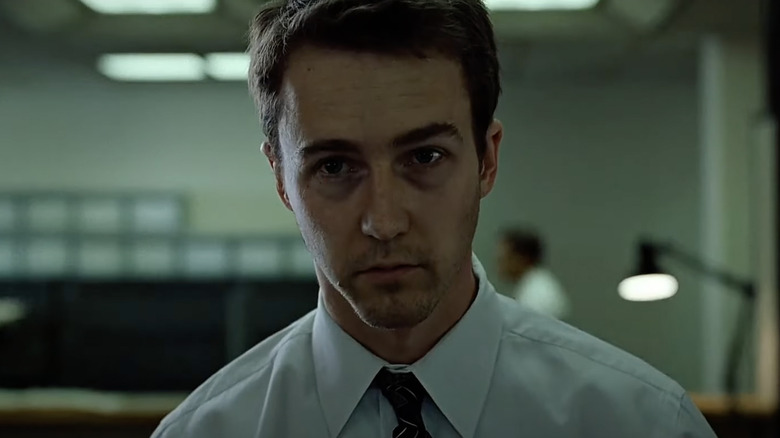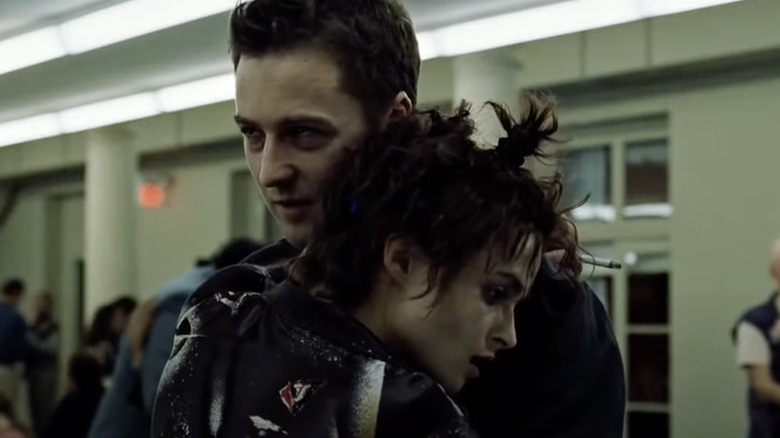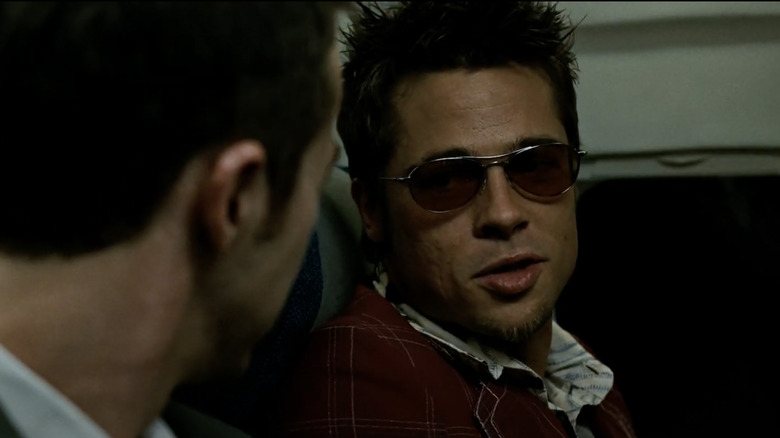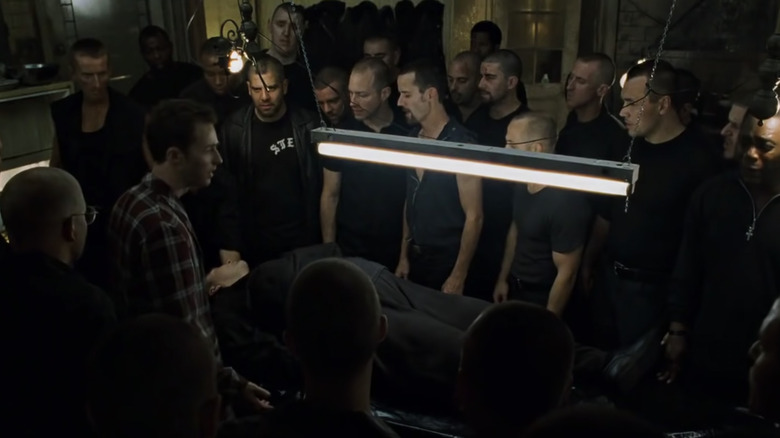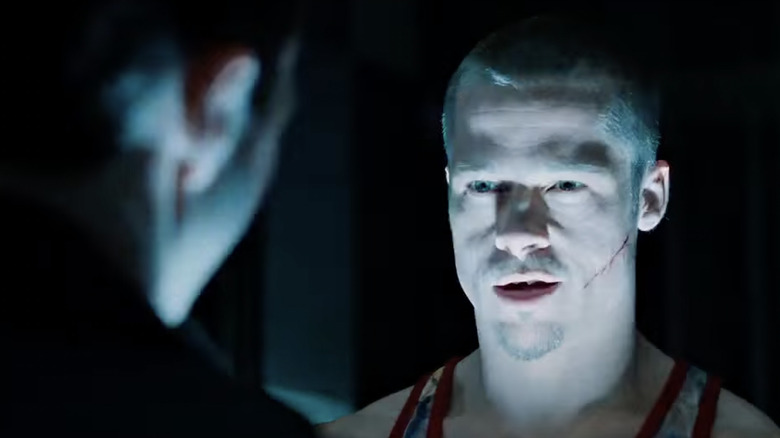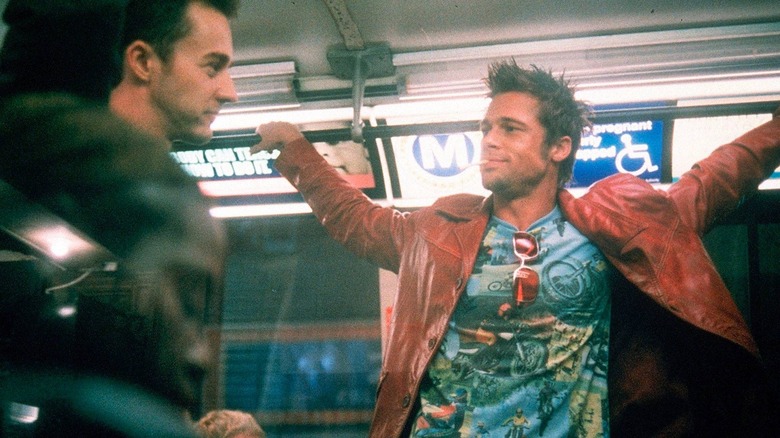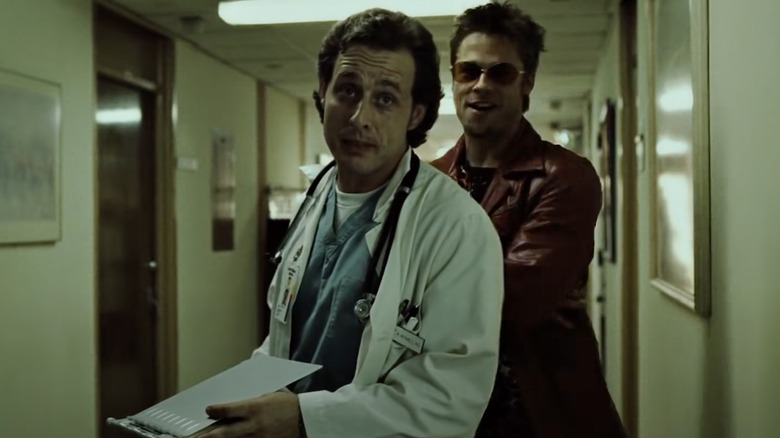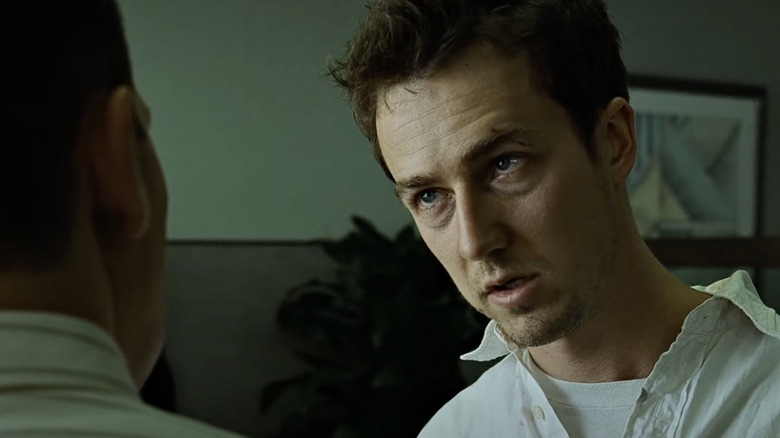The Most Confusing Moments Of Fight Club Explained
At the time of its release in 1999, "Fight Club" may have received divisive reviews from critics and audiences and bombed at the box office, but the film went on to become a commercial success through home media sales and has since become a cult classic — with The New York Times calling it the "defining cult movie of our time" 10 years after the film's release. Adapted from Chuck Palahniuk's novel of the same name by director David Fincher, "Fight Club" follows an unnamed Narrator (Edward Norton), a discontented white-collar employee who begins a fight club with enigmatic soap salesman Tyler Durden (Brad Pitt) — both of whom would go on to develop a complicated relationship with Marla Singer (Helena Bonham Carter).
While the film's seemingly complex plot and themes may have proved to be too confusing for its audiences at the time, it has led audiences to watch the film repeatedly in the following years, allowing them to discover new themes, overtones, and foreshadows with each rewatch. In addition to its gripping narrative and insightful commentary on consumerism and toxic masculinity, the film's replay value mostly comes from the audience's desire to decipher the several confusing parts of the film, particularly the notorious plot twist for which the film is best remembered.
After over two decades since its release and its emergence as a cultural zeitgeist, it's time to break the first two rules of "Fight Club" for the umpteenth time (sorry, Tyler!) as we explain the most confusing moments of the film.
What is the Narrator's name?
Fight Club's rules one and two forbid talking about the club, however, the film also appears to have a key rule of its own: to never reveal the name of the Narrator. The film evasively avoids any mention of the name of the film's protagonist, who's only called "Narrator" in the ending credits (which arguably remains Edward Norton's best movie role role to date). The character's namelessness contributes to his representation of the unnamed everyman, a cog in the capitalist machine who has lost his sense of self and individuality. His lack of a name is cleverly played around with by the fact that he is never addressed by name by other characters in the movie; instead, he is addressed as "sir" by members of Fight Club and Project Mayhem. The film goes so far as to give him multiple names through his attendance at various support groups under various aliases. Marla Singer even asks him after they first meet, "What should I call you? Cornelius? Rupert? Any other of the fake names you use?"
After reading magazine articles written (in first-person) by organs who identify as Jack's organ, the narrator frequently uses the phrase "I am Jack's sense of..." to express how he is feeling at any particular time. The text on the "Fight Club" DVD, as well as its bonus features, refer to the character as Jack, and the chapter list for the film is called "Jack's Chapters." The character is also referred to as Jack in the official shooting screenplay, which Norton confirmed in the DVD commentary of the movie.
Why did Marla stick with the Narrator/Tyler Durden?
A "healthy relationship" would be the last thing to come to mind when thinking of Marla's relationship with the Narrator and, by extension, Tyler Durden. Marla regularly expresses her annoyance at the Narrator's behavior towards her, saying "You f*** me, then snub me. You love me, you hate me. You show me your sensitive side, then you turn into a total a**hole." Even the Narrator didn't know that he was in a sexual relationship with her until he realizes that he himself is Tyler Durden, with whom Marla had a noisy sexual affair that seemed to disturb the Narrator several times. Neither did the Narrator like her as a person, nor did Tyler Durden respect her, telling the Narrator to "get rid of her" after their nights together.
Viewers would wonder, among other things, why Marla would continue to stay with the Narrator after what he had been putting her through. Marla herself admits, "You're the worst thing that's ever happened to me." It has been established that the chain-smoking Marla has grown accustomed to leading a self-destructive lifestyle, possibly to the point that she views toxic relationships as "normal" relationships. This might result from the character's low self-esteem, which makes her cling to and fall in love with the Narrator — especially since he intervened (as Tyler) when she tried to commit suicide by ingesting a bottle of Xanax.
If you or anyone you know is having suicidal thoughts, please call the National Suicide Prevention Lifeline by dialing 988 or by calling 1-800-273-TALK (8255).
Did Tyler Durden exist before the Narrator met him?
After their introduction on the plane, the Narrator seems to be drawn toward Tyler Durden, a mysteriously charismatic soap salesman who seems to be the complete antithesis of the Narrator — even though he later realizes they're both the same person. There are times before their initial encounter when the Narrator may not have noticed Tyler, but audiences have. With the exception of the first time Tyler Durden is clearly seen, as he is riding down the airport escalator that is opposite the one the narrator is on, Tyler Durden is only briefly visible to eagle-eyed viewers in single-frame flashes.
Given that it's likely that Tyler had been taking control of the Narrator's body while the Narrator was sleeping, in a very "Dr. Jekyll and Mr. Hyde" style (nameless capitalist cog by day, anarchist by night), these single frame flashes could either signify that Tyler was being formed inside the Narrator's mind at these moments or that these are remnants of Tyler's memories seeping into the Narrator's mind. Since Tyler admits that he was the one who caused the explosion at the Narrator's condo, which occurred before the Narrator had met Tyler, it is implied that Tyler had been acting and plotting long before he formally presented and introduced himself to the Narrator.
If you're not allowed to talk about Fight Club, how did the club recruit more members?
The first two rules of Fight Club: "You do not talk about Fight Club." Tyler says it sternly to the existing two dozen members of the club. Nevertheless, the club not only continues to attract new members but also metastasizes to become Project Mayhem, an anarchist terrorist organization with "franchises" and hundreds of followers in several other cities, all of whom embrace Tyler's fascist rule without question.
Even though Tyler scolds them for obviously breaking the rules, he doesn't seem to mind that there are more joining. After all, breaking the rules is what Fight Club is all about. The first two rules were meant to be broken, but to be done so discreetly in order to invite new members who could be trusted, proving it to be a clever reverse psychology tactic on Tyler's part. When the Narrator runs into Bob after a long time, Bob excitedly reveals that he's been attending an "underground club" whose first rule is "I'm not supposed to talk about it." The Narrator tells him that he's part of the same club too, and the two talk about the club without uttering its name. It's entirely possible to imagine that word of Fight Club spreading like this, with people talking about the club as though it were a support group for them, which it sort of was.
How were Fight Club and Project Mayhem funded?
Fight Club and Project Mayhem, as much as they seem to be very anti-establishment, grow to become something with hundreds of members spread over multiple cities, functioning as their own army with their own strategy and planning, along with weaponry, arsenals, and explosives. Project Mayhem aims to bomb several buildings of credit card companies, an endeavor that would need a significant amount of finances and resources. So how did Tyler and his army amass sufficient funds to support its soldiers as well as the materials required to complete such a massive undertaking?
To finance Fight Club, Tyler had been making luxury soap out of the fats dumped in the garbage facilities of liposuction clinics, which he would sell to wealthy clients for a hefty price of $21 dollars apiece. Still, since Tyler seems to be the sole proprietor of his small-scale soap business — he creates, advertises, and distributes the soap alone — he wouldn't generate enough revenue to support the club.
In the hilariously brutal "I am Jack's smirking revenge" scene, the Narrator blackmails his boss with compromising insider information about the company they work for in exchange for a full salary and perks as an "outside consultant." While this provides one potential source of finance, it is still exceedingly improbable that a single person's average salary would be enough for the army and resources that Project Mayhem has shown to amass. However, it is possible that the project members had not only forfeited any financial support from the groups but also may have contributed their own earnings to support the "movement" they strongly believed in and followed blindly.
How did the Narrator kill Tyler Durden?
At the climax of the film, Tyler appears to have the upper hand over the Narrator — having punched, kicked, and thrown the Narrator into a glass booth and off the stairs — whereas the Narrator can't even shoot his gun at Tyler or hurt him any other way (since Tyler is a mental projection). However, the Narrator realizes that if Tyler is holding a gun, so is the Narrator himself. He turns the table by aiming the gun at himself, prompting Tyler to finally take the Narrator seriously. After telling Tyler to "really listen" to him, the Narrator puts the barrel in his mouth and shoots himself in the jaw. Smoke spews out of Tyler's nose and mouth as he bleeds and collapses to the floor.
The gunshot wound isn't fatal enough for the Narrator to pass out; he can still communicate with his soldiers and Marla (despite great difficulty and discomfort). The more you think about it, the more questions arise about the logic of Tyler's death. What specifically causes Tyler Durden, who exists only in the Narrator's head, to believe that he has been killed by a single bullet to the Narrator's jaw? The reasoning goes that Tyler and the Narrator's entire final showdown is more of a mental struggle within the Narrator's head than it is a physical one. After realizing that he is ultimately the one in control, the Narrator shoots himself non-fatally in order to watch his projection of Tyler die in front of him and ensure that Tyler would never return.
If you or anyone you know is having suicidal thoughts, please call the National Suicide Prevention Lifeline by dialing 988 or by calling 1-800-273-TALK (8255).
What was the significance of soap?
With the tagline "Mischief. Mayhem. Soap." and the film's title "Fight Club" inscribed on a pink soap similar to those Tyler manufactures, soap has been a key aspect of the movie's marketing as well as playing a symbolic significance in the plot of "Fight Club." The Narrator is introduced to Tyler Durden, a seemingly successful luxury soap entrepreneur. Only after spending more time with Tyler and getting to know him better does the Narrator realize how Tyler makes his soaps: by breaking into liposuction clinics' garbage areas and stealing discarded fats, Tyler then uses those fats to make the luxury soaps and sells them to the same clients who likely underwent liposuction, "selling their fat back to them" for a high price.
While soap is a cleaning agent, the history of soap manufacturing is rather "dirty" and unpleasant. In Ancient Mesopotamia, soap had been made by cooking fats attained from slaughtered animals. Along with being symbolic of the sacrifices made for the advancement of human civilization, soaps also have a history of being a luxury item, being accessible only to the European aristocracy during the medieval era (via The Conversation). Tyler, who despises riches and vanity, sells these soaps (cooked from the fats removed from wealthy clients at liposuction clinics) to the same assortment of wealthy clientele who'd rather turn a blind eye to the "dirty" process of creating soap as long as it keeps them clean. Tyler, in many ways, uses the same justification for the sacrifices made in his pursuit of a wide-scale "cleansing" of humanity by destroying all that represents capitalism and consumerism.
What are those single-frame blips in the first few minutes?
As Tyler would say, "the audience doesn't know they saw it, but they did." To anyone watching "Fight Club" for the first time, the few single-frame "blips" that appear in the initial few minutes of the film could be disorientating and perplexing (a sign of more confusing things to come). It is only after they finish watching the movie for the first time and revisit it with a keen eye to pause at the precise frame, they realize it was Tyler who "blipped" in these frames — which was somewhat symbolic of the part about Tyler editing movie reels together for quick flashes. When attentive viewers would pause the frames, they would notice Tyler striking relaxed poses as though he were teaser-foreshadowing his meeting with the Narrator.
It's also possible that Tyler had been operating behind the Narrator's back whenever the Narrator was asleep (going by the "Narrator-by-day, Tyler-by-night" theory). Tyler's memories and personality may be beginning to 'bleed' into the Narrator's conscious mind as well as his present moments, which may be why Tyler eventually introduces himself to keep the two personalities balanced and distinct. In Marvel's "Moon Knight," a more modern example of a similar situation, Marc Spector had been able to function without Steven Grant being aware that he has a second personality, but after a series of events, it was no longer possible to keep that a secret from Steven anymore. It's interesting to note that both Steven Grant and the Narrator have troubles with insomnia, which play into their split/alternate identities in "Moon Knight" and "Fight Club."
At which moments did the Narrator become Tyler Durden in the film?
Marla's constant irritations with the Narrator's behavior should have been one of viewers' first (of many) clues into the "Fight Club" twist reveal that he and Tyler Durden are the same people – as she tells him, "You are such a nutcase, I can't even begin to keep up." Upon rewatching the film, it becomes somewhat of a game to point out precise moments and scenes where the Narrator was actually Tyler Durden — revealed by his behavioral changes, intentional continuity errors, and other easter eggs planted by the filmmakers. Tyler explains how their split personality works, "Sometimes you're still you. Other times, you imagine yourself watching me," suggesting that Tyler is more than merely a projection as depicted in the film; rather, the Narrator transforms into Tyler by imagining a projection of himself watching Tyler.
Aside from the scenes that are flashed back when the Narrator realizes he is Tyler and we witness the same events happening now that the Narrator is in Tyler's place, one prominent scene stands out where the Narrator's boss confronts the Narrator after finding a print of "Fight Club" rules and confronts him on his recently erratic behavior in the office. The Narrator responds rudely and threatens his boss that he might just "lose it" one day, bring a gun, and open fire in the office. The threatening aspect of Edward Norton's portrayal in the scene seems out of character for the usually meek Narrator, and it is uncannily similar to Brad Pitt's unsettling portrayal of Tyler Durden. While Tyler's attitude and manner of life are supposed to be influencing him, it appears that the Narrator is actually being "possessed" by Tyler in this scene. The Narrator even ends the scene by saying, "Tyler's words coming out of my mouth." It's also interesting to see that the Narrator's goatee-like stubble in the sequence matches that of Tyler's.
